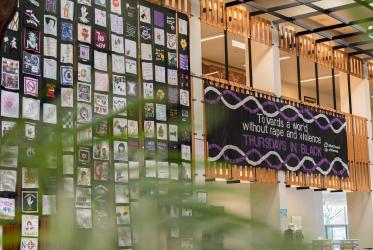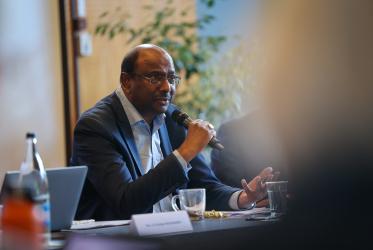The award, presented by the Geneva Internet Platform, DiploFoundation, and Cantone de Geneve, encourages convergences around development, human rights, digital and other policy issues between communities worldwide and International Geneva, host of many international negotiations with an impact across countries and continents.
“During 2021, most of all, the WCC continued to use its social media channels to spread a message of hope—whether that hope was related to digital justice, a violence-free world, or hearing the voices of a vulnerable communities,” said WCC Communication director Marianne Ejdersten. “Social media channels were crucial in helping people access over 100 online productions—including webinars, webcasts, podcasts, and video messages—that shared the prophetic work of WCC member churches.”
During 2021, social media and other online channels continued to help sustain the WCC fellowship in a time when physical activities continued to be limited. “This dimension of the WCC’s work also extended to advocacy,” said Ejdersten.
For example, the Easter initiative by the WCC Ecumenical Accompaniment Programme in Palestine and Israel set out to connect the Biblical narrative with current realities in Palestine and Israel, and used social media and other online channels to spotlight the injustices of life under occupation.
“We were able to bring to the fore realities of injustice and opportunities for advocacy and messages of hope even when onsite accompaniment of vulnerable communities has been limited because of the pandemic,” said Ejdersten.
During 2021, the audience of the WCC website grew by more than 50%, as a result of both renewed WCC online presence and active engagement with the WCC audience on social media.
In September 2021, the WCC, with the World Association for Christian Communication and other partners, organized a symposium on “Communication for Social Justice in a Digital Age,” the fruits of which were shared globally. From video clips to quotes, feature stories to tweets, the WCC was able to showcase the diverse voices from the symposium.
Social media also played an essential role in spreading the news to ensure a global and participative attendance to the hybrid event.
The Thursdays in Black campaign—which in part helped earn the WCC a second-place Geneva Engage Award last year—continued building momentum in unique ways. In 2021, two leaders from interreligious networks—including Religions for Peace and the Network of Traditional and Religious Peacemaker #ThursdaysinBlack in social media.
Another unique Thursdays in Black venture in 2021 was offering Bible studies online—both as document and via live events—so that people could join discussions and reflections from all over the world.
The Ecumenical Prayer Cycle was another avenue of hope that people across the world could access via social media. Online publications also spread a wealth of accurate information, inspiration and guidance on topics ranging from COVID-19, to moral discernment, to climate change.
This is the fourth time the WCC has been among the top five organizations to receive the Geneva Engage honor.
Learn more about Geneva Engage Awards
Symposium on Communication for Social Justice in a Digital Age









